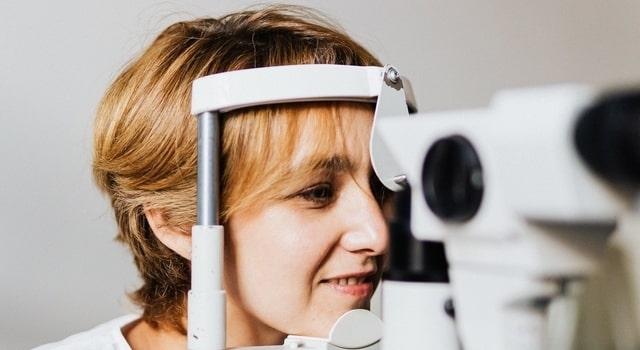
If you’ve ever had a vision screening—whether at school, at work, or as part of a routine health check—you may have noticed how quick and straightforward the process was. While vision screenings can help identify basic vision problems, they are limited in what they assess.
On the other hand, a comprehensive eye exam provides a thorough evaluation of your eye health, ensuring that any issues are detected early and addressed promptly.
At Vancouver Vision Clinic, we believe in the importance of thorough eye care to maintain clear vision and prevent potential eye diseases.
Here’s why a comprehensive eye exam is more beneficial than a simple screening.
What Does Vision Screenings Include?
A vision screening is a brief test that usually measures how well you can see at various distances. The primary goal of a screening is to identify major vision issues like nearsightedness or farsightedness that might require corrective lenses.
While useful as a first step, vision screenings have several limitations:
- Limited Scope: Screenings primarily focus on visual clarity and don’t assess the overall health of your eyes.
- Not Diagnostic: A vision screening cannot diagnose eye diseases like glaucoma or cataracts, as it doesn’t involve the in-depth testing needed to detect these conditions.
- Quick and Generalized: Often conducted by non-specialists, vision screenings take only a few minutes and flag potential issues that need further examination.
What Does a Full Eye Exam Include?
A comprehensive eye exam, however, is a detailed assessment of your vision and eye health. Conducted by a licensed optometrist, a comprehensive eye exam can uncover not only vision issues but also detect early signs of serious eye diseases that could lead to vision loss. At Vancouver Vision Clinic, our eye exams include the following:
Medical and Eye Health History Review
Your optometrist will review your overall health, medications, and any vision symptoms you may have been experiencing. This provides valuable context for understanding potential risk factors for eye conditions.
Visual Acuity and Refractive Testing
Like a vision screening, a comprehensive exam includes tests to check how well you can see at different distances. Your optometrist will also determine the exact prescription for glasses or contact lenses.
Eye Muscle and Movement Tests
Eye alignment and coordination are key to focusing on objects and reading. Your optometrist will assess how well your eyes work together and whether any issues with muscle control could affect your vision.
Tonometry (Eye Pressure Test)
Tonometry measures the pressure inside your eyes and is a vital test for detecting glaucoma, a condition that can cause irreversible vision loss if untreated.
Retinal Examination
Using pupil dilation or advanced imaging technology, your optometrist can closely examine the retina, optic nerve, and other important parts of the eye. This thorough examination helps detect issues like diabetic retinopathy, macular degeneration, and retinal detachment.
Peripheral Vision Testing
A comprehensive eye exam often includes testing your peripheral (side) vision to detect blind spots or other visual abnormalities that a screening might miss.
Why Is a Full Eye Exam Better?
While vision screenings are a good starting point, they fall short of protecting your long-term eye health. Here’s why requesting regular comprehensive eye exams is essential:
- Detecting Eye Diseases Early: Many eye conditions, such as glaucoma and macular degeneration, progress slowly and may not show symptoms until it’s too late. A comprehensive eye exam can catch these diseases early, allowing for timely treatment that can preserve your vision.
- Customizing Vision Correction: A comprehensive eye exam provides a precise prescription for glasses or contact lenses, ensuring that you see clearly and comfortably without the risk of headaches, eye strain, or fatigue.
- Comprehensive Eye Health Assessment: Unlike a vision screening, which only checks for refractive errors, a comprehensive eye exam evaluates the health of your entire eye. This helps detect problems that could impact your vision and overall well-being.
Who Should Have a Full Eye Exam?
Everyone can benefit from regular comprehensive eye exams, regardless of their age or current vision status. Here’s how often different groups should have comprehensive eye exams:
- Children: Kids should have their first comprehensive eye exam by age three and regular check-ups throughout their school years to catch vision problems early.
- Adults: Adults should have a comprehensive eye exam every one to two years, depending on their vision needs and risk factors for eye conditions.
- Seniors: As we age, the risk of developing eye diseases increases. Seniors should request yearly exams to monitor for conditions like cataracts and macular degeneration.
Request Your Eye Exam
At Vancouver Vision Clinic, we’re dedicated to providing the best possible care for your eyes. Whether you’ve been relying on simple screenings or it’s been a while since your last exam, now is the time to prioritize your vision health.
A full eye exam gives you a complete picture of your eye health, ensuring that any problems are detected and treated early.
Request your comprehensive eye exam with us to ensure that your vision remains clear and your eyes stay healthy for years to come.

